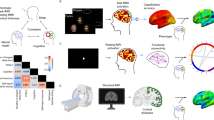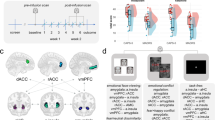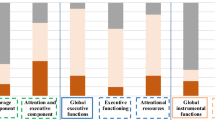Abstract
The antidepressant and cerebral metabolic effects of total sleep deprivation (TSD) or partial sleep deprivation (PSD) for one night has been studied with functional neuroimaging in seven publications from five different groups. Despite the variations in methods and techniques, the over-all findings were relatively consistent. First, before sleep deprivation, responders have significantly elevated metabolism compared with non-responders and normal controls, in the orbital medial prefrontal cortex, and especially the ventral portions of the anterior cingulate cortex. Second, after sleep deprivation, these hyperactive areas normalize in the responders. One functional imaging study suggested that synaptic dopamine release was associated with the antidepressant effects of TSD. The neurochemical implications of these findings are explored. Possible dopaminergic and serotonergic mechanisms are discussed.
Similar content being viewed by others
Log in or create a free account to read this content
Gain free access to this article, as well as selected content from this journal and more on nature.com
or
References
Asikainen M, Toppila J, Alanko L, Ward DJ, Stenberg D, Porkka-Heiskanen T . (1997): Sleep deprivation increases brain serotonin turnover in the rat. NeuroReport 8: 1577–1582
Benedetti F, Barbini B, Campori E, Colombo C, Smeraldi E . (1996): Dopamine agonist amineptine prevents the antidepressant effect of sleep deprivation. Psychiatry Res 65: 179–184
Benedetti F, Serretti A, Colombo C, Campori E, Barbini B, di Bella D, Smeraldi E . (1999): Influence of a functional polymorphism within the promoter of the serotonin transporter gene on the effects of total sleep deprivation in bipolar depression. American Journal of Psychiatry 156: 1450–1452
Borbely AA, Steigrad P, Tobler I . (1980): Effect of sleep deprivation on brain serotonin in the rat. Behav Brain Res 1: 205–210
Buchsbaum MS, Wu J, Siegel BV, Hackett E, Trenary M, Abel L, Reynolds C . (1997): Effect of sertraline on regional metabolic rate in patients with affective disorder. Biol Psychiatry 41: 15–22
Bump GM, Reynolds CF, Smith G, Pollock BG, Dew MA, Mazumdar S, Geary M, Houck PR, Kupfer DJ . (1997): Accelerating response in geriatric depression: a pilot study combining sleep deprivation and paroxetine. Depression and Anxiety 6: 113–118
DeMet EM, Chicz-DeMet A, Fallon JH, Sokolski KN . (1999): Sleep deprivation therapy in depressive illness and Parkinson's disease. Prog Neuropsychopharmacol Biol Psychiatry 23: 753–784
Devinsky O, Morrell MJ, Vogt BA . (1995): Contributions of anterior cingulate cortex to behaviour. Brain 118: 279–306
Ebert D, Feistel H, Barocka A . (1991): Effects of sleep deprivation on the limbic system and the frontal lobes in affective disorders: a study with Tc-99m-HMPAO SPECT. Psychiatry Res Neuroimaging 40: 247–251
Ebert D, Feistel H, Barocka A, Kaschka W . (1994a): Increased limbic blood flow and total sleep deprivation in major depression with melancholia. Psych Res 55: 101–109
Ebert D, Feistel H, Kaschka W, Barocka A, Pirner A . (1994b): Single photon emission computerized tomography assessment of cerebral dopamine D2 receptor blockade in depression before and after sleep deprivation—preliminary results. Biol Psychiatry 35: 880–885
Ebert D, Albert R, Hammon G, Strasser B, May A, Merz A . (1996): Eye-blink rates and depression. Is the antidepressant effect of sleep deprivation mediated by the dopamine system? Neuropsychopharmacology 15: 332–339
Ebert D, Berger M . (1998): Neurobiological similarities in antidepressant sleep deprivation and psychostimulant use: a psychostimulant theory of antidepressant sleep deprivation. Psychopharmacology (Berl) 140: 1–10
Gardner JP, Fornal CA, Jacobs BL . (1997): Effects of sleep deprivation on serotonergic neuronal activity in the dorsal raphe nucleus of the freely moving cat. Neuropsychopharmacology 17: 72–81
Gerner RH, Post RM, Gillin JC, Bunney WE Jr . (1979): Biological and behavioral effects of one night sleep deprivation in depressed patients and normals. J Psychiatr Res 15: 21–40
Gillin JC, Buchsbaum M, Wu J, Clark C, Bunney W Jr . (2001): Sleep deprivation as a model experimental antidepressant treatment: Findings from functional brain imaging. Depression and Anxiety (in press).
Holthoff VA, Beuthien-Baumann B, Pietrzyk U, Pinkert J, Oehme L, Franke WG, Bach O . (1999): Changes in regional cerebral perfusion in depression. SPECT monitoring of response to treatment. Nervenarzt 70: 620–626
Mayberg HS, Brannan SK, Mahurin RK, Jerabek PA, Brickman JS, Tekell JL, Silva JA, McGinnis S, Glass TG, Martin CC, Fox PT . (1997): Cingulate function in depression: a potential predictor of treatment response. Neuroreport 8: 1057–1061
Neumeister A, Praschak-Rieder N, Hesselmann B, Vitouch O, Rauh M, Barocka A, Tauscher J, Kasper S . (1998): Effects of tryptophan depletion in drug-free depressed patients who responded to total sleep deprivation. Arch Gen Psychiatry 55: 167–172
Pizzagalli D, Pascual-Marqui RD, Nitschke JB, Oakes TR, Larson CL, Abercrombie HC, Schaefer SM, Koger JV, Benca RM, Davidson RJ . (2001): Anterior cingulate activity as a predictor of degree of treatment response in major depression: evidence from brain electrical tomography analysis. American Journal of Psychiatry 158: 405–415
Smeraldi E, Benedetti F, Barbini B, Campori E, Colombo C . (1999): Sustained antidepressant effect of sleep deprivation combined with pindolol in bipolar depression: A placebo-controlled trial. Neuropsychopharmacology 20: 380–385
Smith GS, Reynolds CF 3rd, Pollock B, Derbyshire S, Nofzinger E, Dew MA, Houck PR, Milko D, Meltzer CC, Kupfer DJ . (1999): Cerebral glucose metabolic response to combined total sleep deprivation and antidepressant treatment in geriatric depression. Am J Psychiatry 156: 683–689
Volk SA, Kaendler SH, Hertel A, Maul FD, Manoocheri R, Weber R, Georgi K, Pflug B, Hor G . (1997): Can response to partial sleep deprivation in depressed patients be predicted by regional changes of cerebral blood flow? Psychiatry Res 75: 67–74
Volk S, Kaendler SH, Weber R, Georgi K, Maul F, Hertel A, Pflug B, Hor G . (1992): Evaluation of the effects of total sleep deprivation on cerebral blood flow using single photon emission computerized tomography. Acta Psychiatr Scand 86: 478–483
Wu J, Buchsbaum MS, Gillin JC, Tang C, Cadwell S, Wiegand M, Najafi A, Klein E, Hazen K, Bunney WE Jr . (1999): Prediction of antidepressant effects of sleep deprivation by metabolic rates in the ventral anterior cingulate and medial prefrontal cortex. Am J Psychiatry 156: 1149–1158
Wu JC, Gillin JC, Buchsbaum MS, Hershey T, Johnson JC, Bunney WE Jr . (1992): Effect of sleep deprivation on brain metabolism of depressed patients. Am J Psychiatry 149: 538–543
Wu JC, Bunney WE . (1990): The biological basis of an antidepressant response to sleep deprivation and relapse: review and hypothesis. Am J Psychiatry 147: 14–21
Author information
Authors and Affiliations
Corresponding author
Rights and permissions
About this article
Cite this article
Wu, J., Buchsbaum, M. & Bunney, W. Clinical Neurochemical Implications of Sleep Deprivation's Effects on the Anterior Cingulate of Depressed Responders. Neuropsychopharmacol 25 (Suppl 1), S74–S78 (2001). https://doi.org/10.1016/S0893-133X(01)00336-0
Issue date:
DOI: https://doi.org/10.1016/S0893-133X(01)00336-0
Keywords
This article is cited by
-
Antidepressant treatment effects on dopamine transporter availability in patients with major depression: a prospective 123I-FP-CIT SPECT imaging genetic study
Journal of Neural Transmission (2018)
-
Stem Cell Factor (SCF) is a putative biomarker of antidepressant response
Journal of Neuroimmune Pharmacology (2016)
-
Lithium and GSK-3β promoter gene variants influence cortical gray matter volumes in bipolar disorder
Psychopharmacology (2015)
-
Blockade of Astrocytic Glutamate Uptake in Rats Induces Signs of Anhedonia and Impaired Spatial Memory
Neuropsychopharmacology (2010)
-
Overlapping and Distinct Brain Regions Associated with the Anxiolytic Effects of Chlordiazepoxide and Chronic Fluoxetine
Neuropsychopharmacology (2008)



